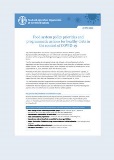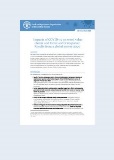Policy briefs
The COVID-19 pandemic is impacting not only food trade, food supply chains and markets but also people’s lives, livelihoods and nutrition.
This collection of policy briefs presents a qualitative and quantitative assessment of the pandemic’s impacts on these areas.
Briefs are released on a day-to-day basis. Please check back frequently for the latest available briefs.
For media queries on any of the below topics, please contact [email protected]

Africa’s youth in agrifood systems: Innovation in the context of COVID-19
12/08/2020
Prior to the COVID-19 pandemic, young entrepreneurs in agrifood systems in sub-Saharan Africa were already facing a number of challenges. The main challenges include limited access to natural resources, finance, technology, knowledge and information, and insufficient participation in policy dialogues and other decision-making processes. The COVID-19 pandemic and its disruptions to...

Food system policy priorities and programmatic actions for healthy diets in the context of COVID-19
12/08/2020
The COVID-19 pandemic has created supply and demand shocks in the food systems, disproportionately affecting the poor and nutritionally vulnerable groups. A possible economic slowdown further compounds challenges faced by governments in tackling malnutrition in all its forms.This brief presents policy and programmatic actions adopted by countries and development partners...

Responding to COVID-19 food disruptions in Africa
13/08/2020
This situation report is a consolidation of information on food system disruptions in Africa due to COVID-19 for the period of 1–15 July 2020. As a collaboration between the Food and Agriculture Organization of the United Nations (FAO) and the University of Minnesota – Strategic Partnerships and Research Collaborative, the...

COVID-19 crisis and support for agrifood: Public sector responses through the financial sector
18/08/2020
This policy brief aims to provide useful information for policymakers and other stakeholders in developing countries who are in the process of designing COVID-19 response programmes addressing the needs of agrifood and rural sectors through dedicated rural finance instruments and broader financial sector involvement. The brief discusses emerging patterns on...

COVID-19 and the role of local food production in building more resilient local food systems
23/10/2020
COVID-19 pandemic has put local food systems at risk of disruptions along the entire agri-food value chain. Cities and local governments are currently playing a major role in limiting the spread of the coronavirus that causes COVID-19 and in mitigating disruptions to their local food systems. To better understand the situation,...

Impacts of COVID-19 on wood value chains and forest sector response
12/11/2020
This policy brief summarizes the findings from a global survey on the impacts of the coronavirus (COVID-19) outbreak on wood value chains and recovery measures from the forest sector. The survey received responses from 237 stakeholders registered in the Sustainable Wood for a Sustainable World (SW4SW) network, representing all segments...

Protecting land and natural resources tenure rights in the era of COVID-19 by heeding the lessons from the past
19/11/2020
The COVID-19 pandemic has caused severe disruptions around the world, undermining the ability of small food producers to access and control their land and the natural resources they need, and thereby rendering them more vulnerable to encroachment on their tenure rights. While the impact of the COVID-19 crisis is still...

COVID-19 and animals: Information on risk mitigation measures for livestock and agricultural professionals
13/01/2021
In response to the growing concern caused by the new SARS-CoV-2 variant strain, FAO has prepared this document to raise awareness amongst livestock professionals about highly susceptible captive farmed wild or domestic species and provide practical guidelines on how to prevent infecting animals or getting infected. Contact person: Madhur Dhingra, Senior animal health...

The role of social protection in the recovery from COVID-19 impacts in fisheries and aquaculture
24/02/2021
Food systems were severely hit by COVID-19 and the related restrictions to the movement of people and goods. In fisheries and aquaculture, the socio-economic effects of COVID-19 are manifold including changes in consumer demand, limited storage facilities, drop in fresh fish prices and stopping fishing operations. Social protection has been a...

Coping strategies of dairy cooperatives and loss and waste reduction during the COVID-19 pandemic: the case of India and Japan
07/05/2021
Unlike any other crisis, the COVID-19 pandemic significantly impacted food value chains at all levels (production, processing, logistics and even consumer behaviour to name a few). The impacts vary across countries and are constantly changing with the spread of the pandemic as governments, stakeholders and other actors in value chains...

Food systems and COVID-19 in Latin America and the Caribbean
22/06/2021
The COVID-19 pandemic has highlighted the difficulties cities face in managing crises that are exacerbated by population density and depend on supply chains that often start outside the city for their resolution. For this reason, one of the unfortunate consequences of the pandemic crisis has been an increase in hunger...

Impact of COVID-19 on the delivery of veterinary services and animal disease reporting
16/07/2021
The coronavirus disease 2019 (COVID-19) pandemic has changed the lives of individuals, communities, and societies around the world, including those working in the animal health sector. To further examine the impact of COVID-19 on the activities of animal health workers and their ability to report animal disease, the Food and...

Seasonal migration in Europe and Central Asia in the context of the COVID-19 pandemic
30/07/2021
Seasonal migration has been greatly affected by COVID-19 mobility restrictions. More specifically, migrant workers engaged in seasonal employment have suffered an immense blow as a result of the enforcement of lockdown measures, which further increased the uncertainty of their livelihoods and of the welfare and economic security of their households...

National agrifood systems and COVID-19 in South Sudan: Effects, policy responses, and long-term implications
10/02/2022
The COVID-19 pandemic has put significant pressure on health systems all around the world. The drastic measures established to contain its spread are creating serious impediments to economic activity (including agrifood systems) and, consequently, to livelihoods and food security and nutrition. This report is part of a series of country profiles...

Impact of COVID-19 on the human right to adequate food in the Pacific Region
13/09/2022
The COVID-19 crisis is exacerbating food insecurity and malnutrition in the Pacific region as measures to halt the spread of the virus have unintended impacts on people’s lives, such as rising unemployment and poverty. Moreover, lockdowns and mobility restrictions cause disruptions in trade within and between States, reducing the availability...

COVID-19, land, natural resources, gender issues and Indigenous Peoples' rights in Asia
15/09/2022
The COVID-19 crisis has led to reports of encroachment upon indigenous land, creating hardship during an especially difficult time and placing Indigenous Peoples in a precarious situation. In this context, this brief asks specifically what impact COVID-19 is having on Indigenous Peoples’ rights, especially women, elaborating on how challenges could...

Impact assessment of the COVID-19 pandemic in relation to food value chains in the Lori and Tavush regions
07/02/2023
The aim of the Impact assessment of the COVID-19 pandemic in relation to food value chains in the Lori and Tavush regions – Final report is to understand the situation of agricultural and rural development after a few waves of the COVID-19 pandemic to identify key problems and challenges that...
